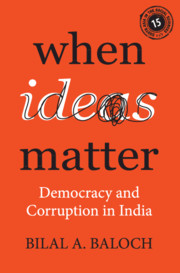Book contents
- Frontmatter
- Dedication
- Contents
- List of Table
- Preface
- Acknowledgments
- List of Abbreviations
- 1 Introduction
- 2 A Constructivist Approach to Political Behavior in India
- 3 The Emergency and the Jayaprakash Narayan Movement
- 4 India under Gandhi: Populism and Partisans
- 5 Checks and Balances and the India Against Corruption Movement
- 6 United Progressive Alliance: Technocrats and Transformations
- 7 The Politics of Ideas in India and Developing Democracies
- Appendices
- Bibliography
- Index
1 - Introduction
Published online by Cambridge University Press: 30 June 2021
- Frontmatter
- Dedication
- Contents
- List of Table
- Preface
- Acknowledgments
- List of Abbreviations
- 1 Introduction
- 2 A Constructivist Approach to Political Behavior in India
- 3 The Emergency and the Jayaprakash Narayan Movement
- 4 India under Gandhi: Populism and Partisans
- 5 Checks and Balances and the India Against Corruption Movement
- 6 United Progressive Alliance: Technocrats and Transformations
- 7 The Politics of Ideas in India and Developing Democracies
- Appendices
- Bibliography
- Index
Summary
Prologue
A phone rang around 9 p.m. in New York City's Upper East Side neighborhood.
“Namaste, is guru-ji there?” enquired a quiet, measured voice.
“Father, I believe India's next Prime Minister is on the line for you,” came the instinctive reply. There had been rumors, after all.
“I have been expecting your call, Manmohan.” The elderly voice of a teacher or guru, a fellow technocrat who had dependably served Mrs. Indira Gandhi 30 years earlier, came calmingly through the phone in Delhi.
“What is your counsel, guru-ji? This game is not for me. We are not supposed to be politicians. I’m an economist.”
There was a pause. And then a response. “The first thing you must do, Manmohan, is sit down and write your resignation letter. Place it in your pocket and take it into work every single day. You have no idea the compromises you will have to make and the battles you will have to fight.”
May 13, 2004, was a momentous day for the Indian National Congress. Against the predictions of pollsters, the party rose to power at the federal level, or center, in a coalition government. It was the return of India's “Grand Old Party” after eight years of political exile on the opposition benches. Just a week later, a different coalition was born, this time unprecedented in the history of Indian politics. On May 22, 2004, India's technocrat prime minister, Dr. Manmohan Singh, walked into Parliament's Ashoka Hall for his swearing-in ceremony. After taking his oath, he approached Mrs. Sonia Gandhi and gave a slight bow of respect. Although Mrs. Gandhi's ability to build a left-leaning coalition, premised on constructing a government for the “common man” (aam aadmi), had won Congress the highest office in India, it would be the former finance minister and chief architect of the 1991 neoliberal reforms, Dr. Singh, who had been anointed by the Gandhi family to sit in that most coveted seat.
Bringing Ideas Back In
How do ideas shape government decision-making? Comparativist scholarship conventionally gives unbridled primacy to external, material interests—such as votes and rents—as proximately shaping political behavior.
- Type
- Chapter
- Information
- When Ideas MatterDemocracy and Corruption in India, pp. 1 - 15Publisher: Cambridge University PressPrint publication year: 2021



